Treaty promise for a Cherokee voice in Congress places tribes on different paths
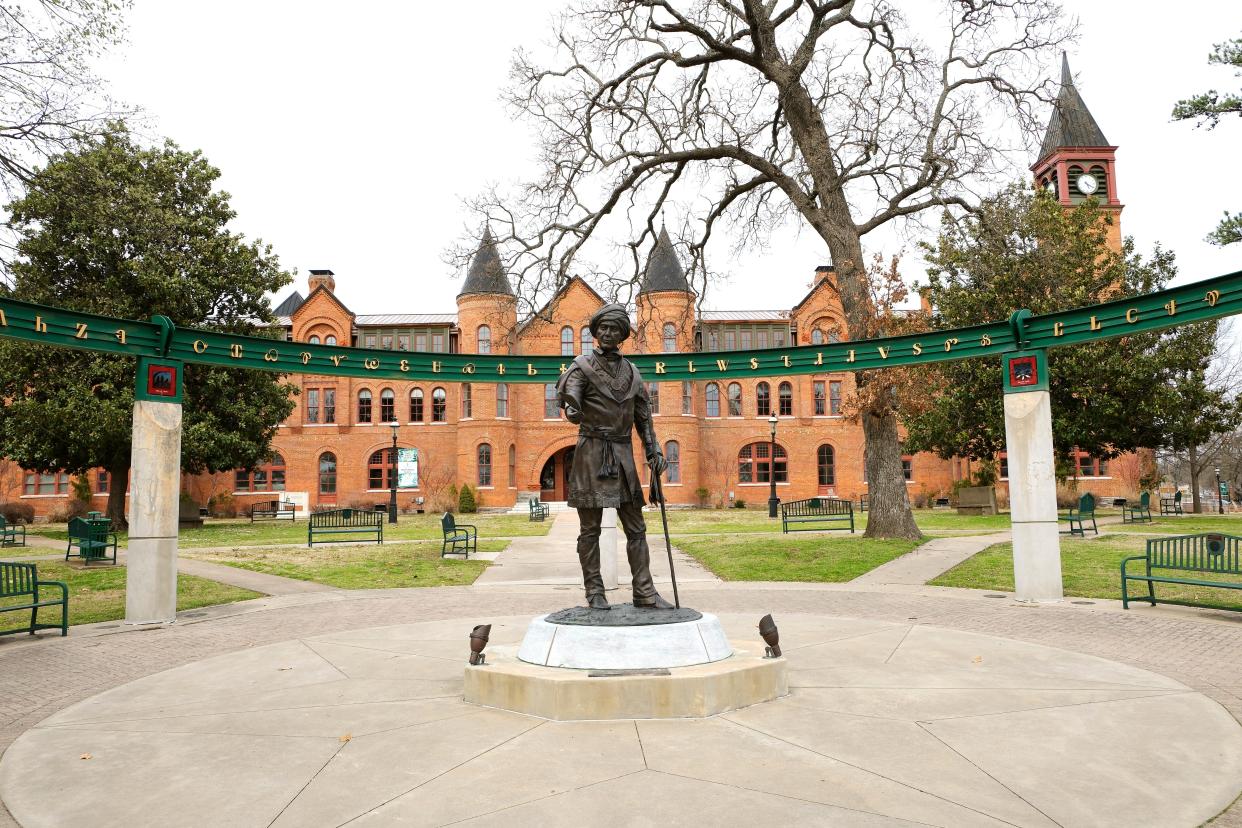
- Oops!Something went wrong.Please try again later.
TAHLEQUAH — In a valley among the rolling foothills of the Ozark Mountains sits this quiet town of about 16,000 rooted in Cherokee culture.
The Cherokee Nation headquarters are on the southern edge of town, and the tribe’s museums, coffee shop, art gallery and office spaces sprawl throughout the downtown blocks. Street signs direct traffic in English and Cherokee.
A bronze statue of Sequoyah, the man who created the Cherokee syllabary, stands at the center of Northeastern State University near downtown. The school was originally a seminary for Native American women. Now it brings students from all over the state to Tahlequah, which locals pronounce as Tal-uh-kwaa.
Visitors may never know the underlying tension that runs through town unless they know the history of an empty parking lot near Walmart. It’s the site of a former casino operated by the United Keetoowah Band, a second Cherokee tribe that also calls Tahlequah home.

The two tribes share a history and operate less than three miles apart, but disputes over land and status have divided them for generations. Those tensions are resurfacing today around the push for Cherokee representation in Congress.
An 1835 treaty promised the Cherokee Nation a congressional delegate in exchange for ceding millions of acres of land to the growing United States. Nearly 200 years later, the Cherokee Nation is building a groundswell of support around its campaign to finally seat a non-voting House delegate. However, leaders of the United Keetoowah Band believe that same treaty also guarantees a delegate for their tribe, a stance that officials from the Cherokee Nation strongly dispute.
Chuck Hoskin Jr., the Cherokee Nation's principal chief, said the treaty is an agreement between two sovereign governments — his tribe and the United States — and continues to apply solely to those two, not the United Keetoowah Band or the related Eastern Band of Cherokee Indians in North Carolina.
“The fact that we do share this wonderful and beautiful heritage and lineage does not trump any aspect of federal Indian law or any aspect of our individualized sovereignty,” Hoskin said.
But Joe Bunch, the chief of the United Keetoowah Band, sees the tribes’ connected histories in a different light. “In those days, there was only one Cherokee nation,” he said.
The conflicting views leave the tribes working to navigate separate paths toward a similar goal: a voice in Congress. Each has chosen a delegate to represent them, and they are trying to persuade House lawmakers to act.
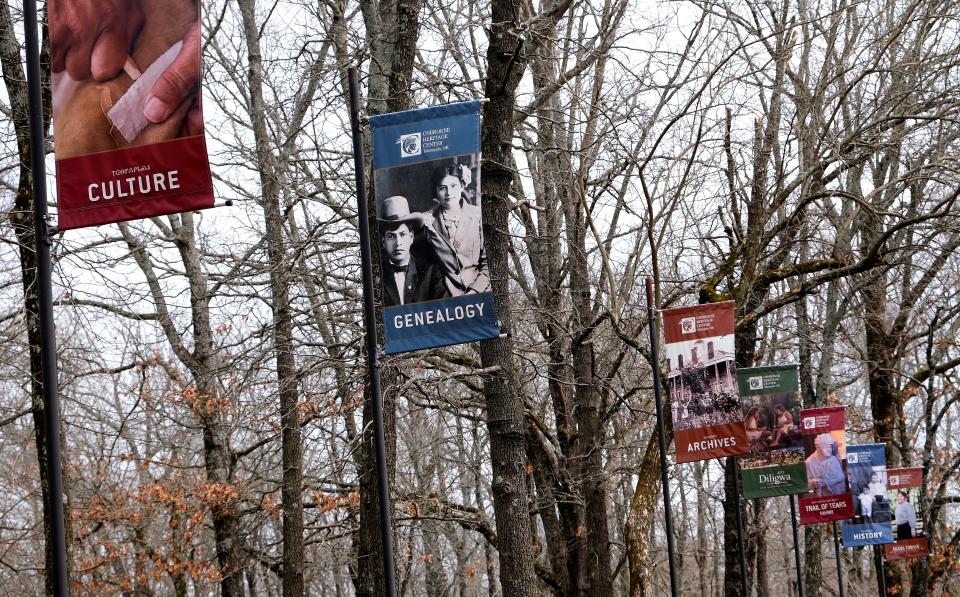
Congressional delegate promised nearly 200 years ago
The Treaty of New Echota established terms to remove Cherokees from their homelands around present-day North Carolina and move to Indian Territory in what is now Oklahoma. Seven million acres were ceded in exchange for $5 million and a promise for a congressional delegate “whenever Congress shall make a provision.”
Citizens of the United Keetoowah Band assert their identity as the “old settlers,” because many trace their ancestry to Cherokees who were among the first to move west and establish themselves in Indian Territory, said Ernestine Berry, director of the United Keetoowah Band museum.
Eventually, the federal government recognized the United Keetoowah Band and the Cherokee Nation as distinct political groups.
Because the United Keetoowah Band is a standalone government, Hoskin contends it is not a party to the treaties signed by the Cherokee Nation. “The distinction, factually, is that the Cherokee Nation’s engagement with the United States goes back to the founding of the United States,” he said.
More: What Cherokee leaders say Oklahoma's governor got 'wildly' wrong about tribal elections
Berry said the Treaty of New Echota itself was controversial and signed by a small group of Cherokees, which led to a scene that resembled a “civil war” in Tahlequah, the designated removal place where some people had already moved.
The impacts of the early political animosity continue to manifest today.
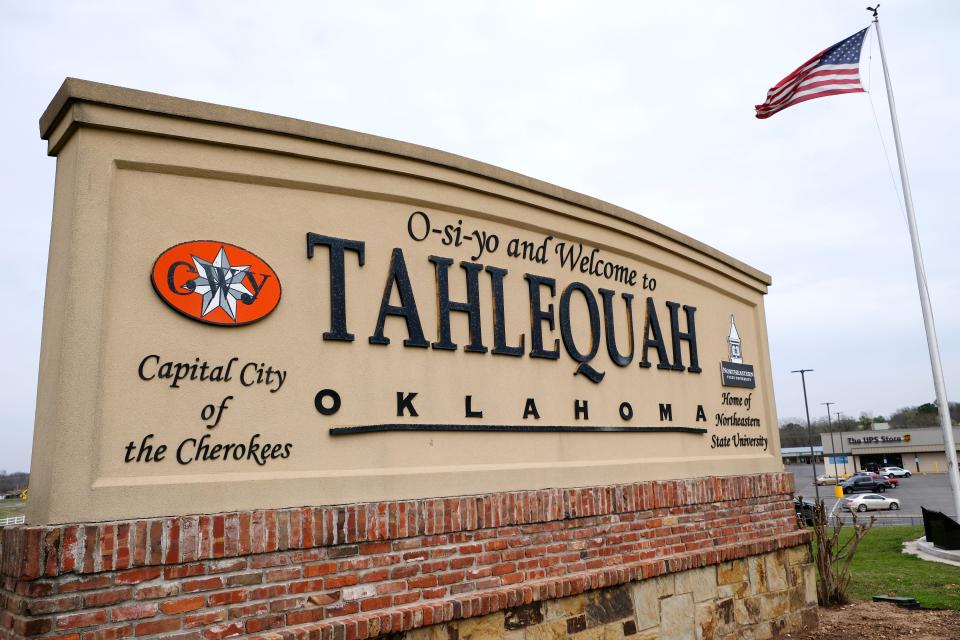
In 2013, the United Keetoowah Band shut down its casino that had operated for 27 years as the tribe’s biggest economic engine. The Cherokee Nation had challenged the casino’s right to operate on the land, which sits within the Cherokee reservation. A federal appeals court sided with the Cherokee Nation.
The casino has never reopened.
More recently, Cherokee Nation officials pushed back against United Keetoowah Band Lighthorse Police exercising authority across the 14-county Cherokee reservation.
“There is no ‘UKB Reservation’,” Cherokee Nation Attorney General Sarah Hill said in a letter sent to the United Keetoowah Band earlier this year. “Treaties gave the Cherokee Nation exclusive tribal jurisdiction on the reservation, and Congress has never given any other tribe jurisdiction on the Cherokee Nation Reservation.”
Lawmakers examine Cherokee treaty rights in historic hearing
Hoskin began advocating for Congress to seat a Cherokee Nation delegate in 2019, the same year he appointed Kimberly Teehee to serve in that role. Her nomination was approved unanimously by the Cherokee Tribal Council.
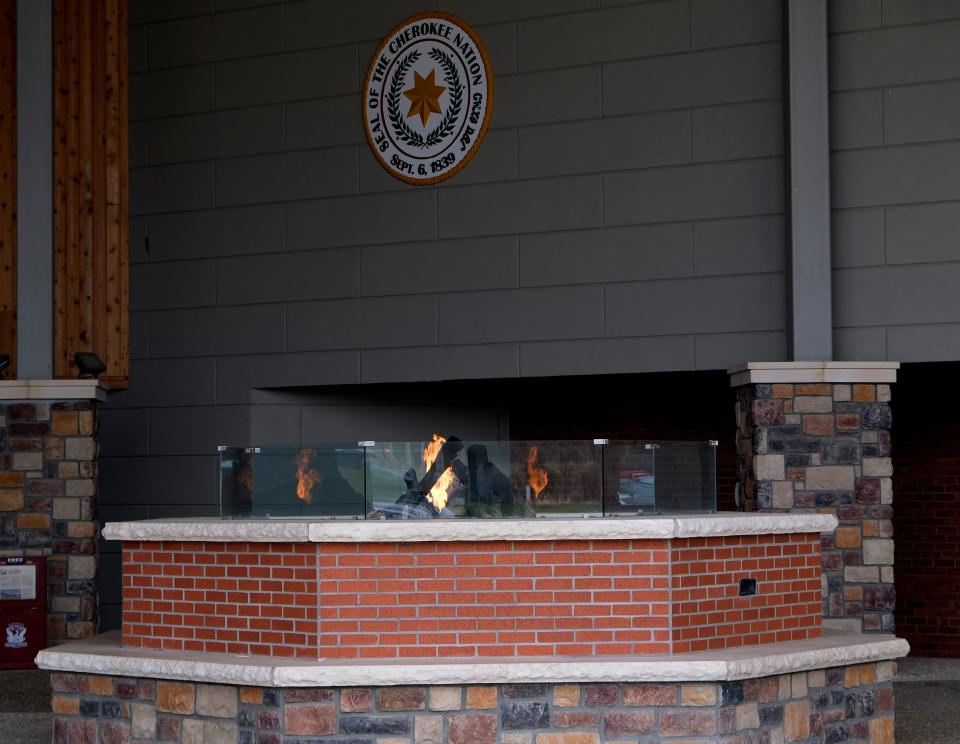
Teehee’s tribal service resume began when she was an intern for the late Wilma Mankiller, the first woman to be principal chief of the Cherokee Nation. More recently, Teehee, an attorney, served as the first-ever senior policy adviser on Native American Affairs for President Barack Obama, where she played an active role in enacting the Violence Against Women Act.
Since her appointment by Hoskin, Teehee has worked on educating members of the House on the rights of Native people and promises granted in the Treaty of New Echota. She has taken a bipartisan approach and concentrated on reaching out to three House committees tied to the issue: rules, administration and natural resources.
“We focused on getting resolutions of support throughout the country,” Teehee said. ”It was really a time to dig deep into the history, because this was a history that takes us back to the 19th century before, right? We had to develop the kinds of materials that members, especially those who wanted to look back to the historic record as it pertained to the House, wanted to know about.”
From the archives: A tribal delegate in Congress? Cherokee campaign ramps up under treaty promise
Support for Teehee has become widespread. After learning about the nearly 200-year-old treaty in a history class and realizing the U.S. government had not fulfilled its promise, students at Palo Alto High School in California created a mural honoring Teehee as a delegate. The mural, which was completed in April, features Teehee standing in front of the seal of the Cherokee Nation and reads “Why Not Now?”
In November 2022, the House Rules Committee also had a hearing to discuss potential pathways to seat a Cherokee delegate. It was the first time the delegate promise has been spoken of in Congress since the treaty was signed.
An attorney for the Congressional Research Office testified that other treaties, specifically those signed with the Delaware and Choctaw nations, also contain provisions that discuss representation in Congress.
Teehee believes Congress should look into those treaties, but move forward separately to seat her as the delegate promised in the Treaty of New Echota.
“Let’s break the glass ceiling first before we start looking into other tribes’ language,” Teehee said. “Let’s start with the strongest case here.”
Disagreement continues over delegate rights
United Keetoowah Band officials want Victoria Holland to represent their interests in Congress. An electronic billboard advertising her as the tribe's chosen delegate stands next to the empty lot where the tribal casino once stood.
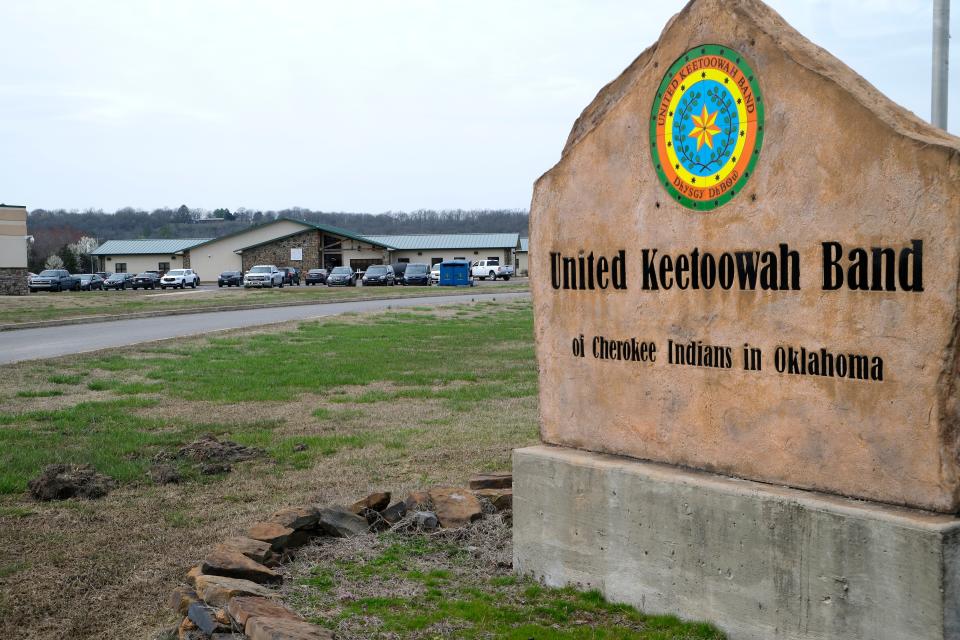
Holland is an attorney who works on behalf of several Oklahoma tribes, including her own, which she believes holds equal rights to the Treaty of New Echota.
“You seat all of the Cherokee delegates or you seat none of the Cherokee delegates, because if you're going to pick and choose which tribe gets a treaty right, then you're picking favorites,” Holland said. “And there’s not a superior Cherokee tribe.”
She sees the political divide between her tribe and the Cherokee Nation as an unnecessary roadblock that prevents them from working side by side to seat a delegate or to address economic and health gaps that persist in Tahlequah. For her, the divide is personal. Her husband and children are Cherokee Nation citizens.
“The reality of it is we all live together. We all work together. We all go to church together,” she said.
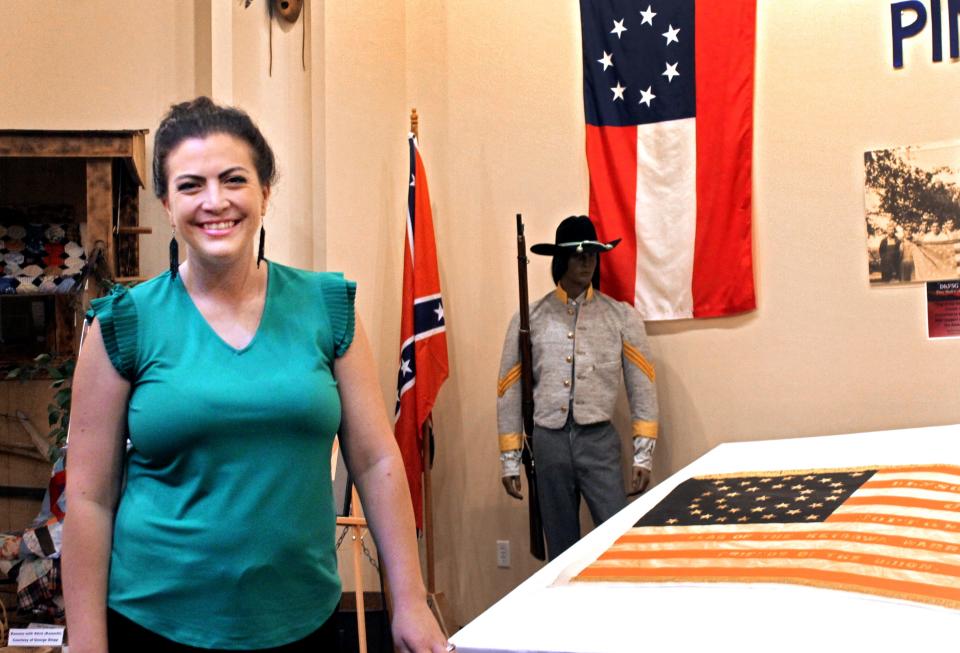
Bunch said he has talked to members of Congress about his tribe’s perspective. He said he believes key lawmakers, including Oklahoma Rep. Tom Cole, understand. But continued trips to lobby members of Congress add up for the small tribe, particularly as lawmakers cycle out of office and new members enter without knowing much about tribal treaty rights.
“So without anyone being there to share our story, guess what? We get left out,” Bunch said.
'Unresolved issues' for Congress to address, top lawmaker says
The reason Cherokee people are divided today is because the federal government imposed its will on Indigenous people and forced them to abandon nearly all of their homelands, said Richard Sneed, chief of the Eastern Band of Cherokee Indians. Members of his tribe are descended from Cherokee people who stayed behind on a remote part of the tribe’s lands.
Sneed believes dissension will stall Congress from taking any steps forward on seating a Cherokee delegate. He thinks the three federally recognized Cherokee tribes should come together and select one person.
“If we present a united front, that takes away the argument from the federal government to say, ‘Well, you three tribes can’t even agree amongst yourselves, so we’re not going to take action until you do,’” he said.
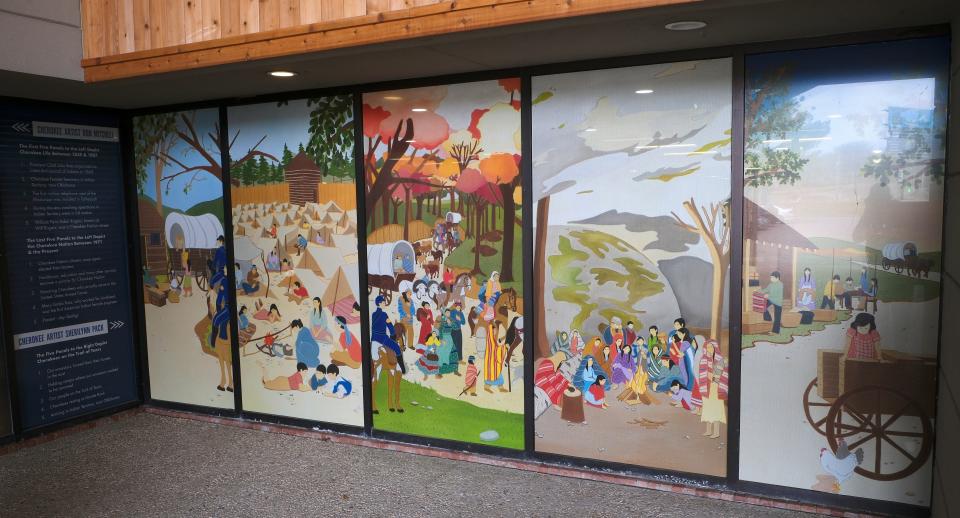
Other tribes also are exploring their own treaty rights. Deborah Dotson, president of the Delaware Nation in Anadarko, is leading the push on behalf of the three federally recognized Delaware tribes. She points to a 1778 treaty provision that also discusses Delaware representation in Congress.
Her goal is to seat three delegates to represent each of the three Delaware tribes or a joint delegate whose seat would rotate from one Delaware tribe to the next. Whichever Congress chooses, Dotson wants lawmakers to act on all delegate treaty rights at the same time.
She believes congressional action is dependent on tribes working together to chart a unified path. “I think if we hand it to them with a red bow and say, ‘Here,’ — they can pass it. It’s something that everybody understands,” she said.
But all of the tribes are facing new hurdles. Control of the House shifted from Democrats to Republicans at the start of the year, shuffling the leadership of top committees. Cole, a Chickasaw Nation citizen, now chairs the House Rules Committee. He has pledged to keep working on the delegate issue, including by sorting through the treaty claims of all tribes.
“There’s a lot of unresolved issues that are institutional, not partisan,” Cole told The Oklahoman earlier this spring. “We don’t have any other delegates that are not elected.”
More: The story behind Gov. Stitt's new 'One Oklahoma' video on tribal reservations
Teehee said she has redoubled her efforts to meet with lawmakers to talk about tribal treaty rights and answer their lingering questions. “In some ways, we’re back to Square One, because we’re back at educating a whole new body that’s now the majority, and we respect that,” she said. “But one thing I think that is in our tribe’s nature, and what we’re accustomed to, is we don’t ever give up. We are persistent.“
Holland thinks it also will be necessary to build more support on the ground. She wants to create a shared space for Cherokee people to work out the common issues they face. “We need to start talking about how we are going to move forward together as Cherokee people.”
Editor's note: This story has been updated to to make clear the formal name of the Cherokee Nation is no longer the Cherokee Nation of Oklahoma and to correct the first name of Richard Sneed, chief of the Eastern Band of Cherokee Indians.
This article originally appeared on Oklahoman: As Cherokee Nation presses for a voice in Congress, so do other tribes

